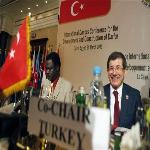21 March 2010

Photo: AP
Turkish Foreign Minister, Ahmet Davutoglu, is right seen as he co chairs the opening of the International donor conference for the development and the construction of Darfur in Cairo, Egypt, 21 Mar 2010
An Organization of the Islamic Conference (OIC) donor meeting has raised $850 million in pledges for Darfur reconstruction. The projects are aimed resettling 2.7 million displaced people.
The Organization of the Islamic Conference meeting in Cairo is the start of a projected $2 billion effort to finance better infrastructure in the war-torn Sudanese region.
Darfur's conflict is not over, but the conference comes at an opportune time. In recent weeks, two main rebel groups have signed cease-fire agreements with the Sudanese government. Qatari-mediated talks have also produced general framework agreements to reach a lasting peace.
Arab League Secretary General Amr Moussa told the 57 Islamic Conference states, as well as dozens of other countries and aid agencies, that such political efforts must be joined by developmental strategies.
Moussa says the combined approach helps guarantee settling conflicts, especially ones with poverty among its sources. Darfur rebels rose up against the central government in 2003 after years of perceived marginalization.
The OIC undertaking is ambitious, it involves not just rebuilding, but in many cases building for the first time the infrastructure that could make Darfur self-sustaining. In many areas, villages were burned by Janjaweed militia, the government-backed, mainly Arab forces that pushed many Black African farmers from their land.
Roads are often just tracks through the desert. Schooling, outside refugee camps, is virtually nonexistant. Even such simple tasks as collecting rainwater have been nearly impossible given the poverty and devastation.
Special African Union-United Nations Envoy to Darfur Ibrahim Gambari says rebuilding will help more than just the people of Darfur.
"Darfur also provides the unique opportunity for donors and development program managers to deal with some of the most pressing global issues - like globalization, desertification, water management and climate change - in a holistic way and manner," he said.
As the countries made their pledges, some noted how much they have given. The United States, for example said it has granted Sudan $6 billion in the past five years.
Former South African president Thabo Mbeki, representing the African Union, noted Sudan faces presidential elections next month and a referendum on Southern Sudan's independence next year.
"We cannot fail to assist Sudan during her hour of need," he said. "This is because such failure, if it were allowed to occur, would have serious negative consequences for generations to come."
Turkish Foreign Minister Ahmet Davutoglu, whose country, along with Egypt, chaired the conference, tried to argue why the stability of the Muslim region and Sudan has implications beyond their borders.
"It is a bridge between races, cultures and religions of the continent," he explained. "The instability of this country negatively affects the whole of Africa as well as its wider region. Whereas Sudan's stability translates into regional peace, harmony and prosperity for which we are ultimately gathered here today."
But the help the conference hopes to provide may not help resolve the racial and cultural mix in Darfur. Many of the new projects are not near the refugees' original homes. Some of the displaced are now refusing to go, arguing it will only help the Janjaweed achieve its goal of displacing them.